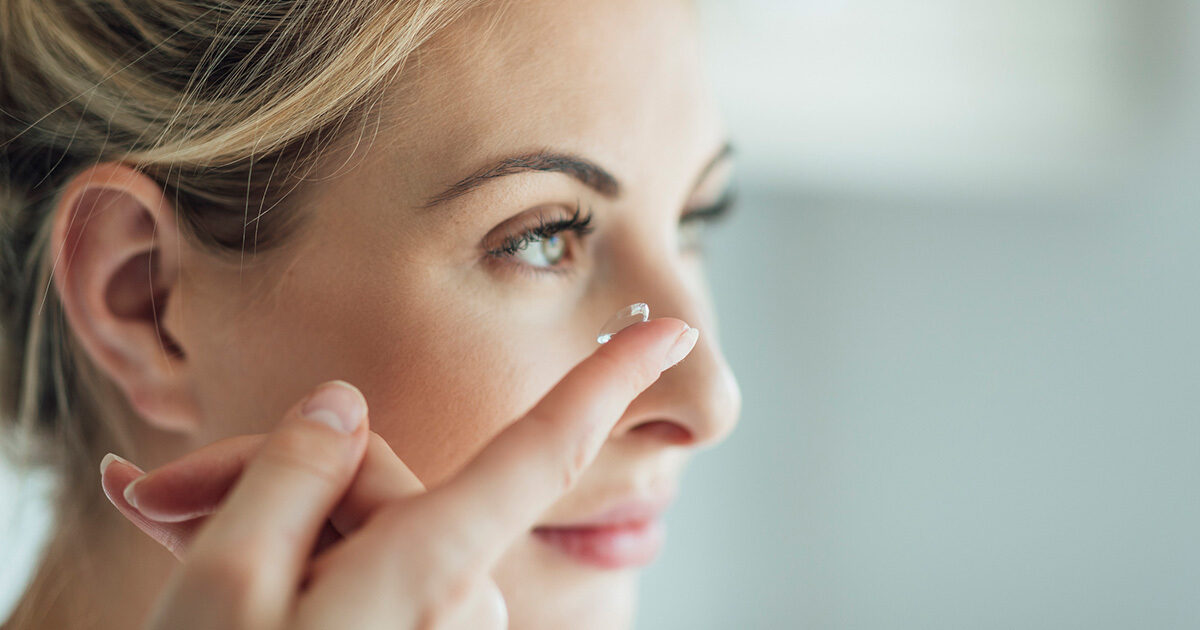A Look Into Contact Lens Health
UT Health Austin ophthalmologist shares insights on healthy contact lens wear and care
Reviewed by: Gene Kim, MD
Written by: Kaylee Fang

Whether you’re new to contacts or have been wearing them for years, eye health is essential to ensuring the long-term wellness of your vision. From different types of contact lenses, including soft and hard ones, to the benefits of vision correction and improved physical activity, contacts offer a world of advantages. However, understanding potential challenges, such as dry-eye syndrome, allergies, and age-appropriate usage, is equally crucial to maintaining optimal eye health.
Types of Contact Lenses
Soft Contacts
Soft contacts are made of silicone hydrogel that offers comfort and flexibility. You may need to change them more frequently because they aren’t very durable. Infection risks are also higher with soft contacts.
Hard Contacts
Hard contacts are made of rigid gas-permeable plastic that ensures stiffness. They also are custom-made, causing them to be more expensive. As long as they are cleaned properly, there is a lesser chance of infection.
“Hard contacts are cleaner and more breathable. You actually see better in hard contacts than soft contacts,” explains Dr. Kim.
Cosmetic Contacts
Wearing decorative contact lenses, such as different colors, can be risky. If they are obtained without a prescription or not used properly, they can cause serious damage to your eyes.
“Avoid getting contacts on the side of the grocery aisle and costume shops because they are the most suffocating types. The safest practice is to not wear colored contacts,” advises Dr. Kim.
Benefits of Contact Lenses
Vision Correction
A contact lens is a medical device that can be worn to correct a variety of vision conditions, such as nearsightedness and farsightedness.
“If you have an extreme prescription, you see better in contacts than glasses. When you wear contacts, you probably see a higher quality of vision. The contacts are draping over the eye, which is what gives more periphery,” says Dr. Kim.
Physical Activity
Contact lenses allow freedom of movement. They offer a better fit and level of comfort if you wear a helmet or other protective gear. They move with the eyes, so the center of the lens is in line of sight, which helps eliminate potential distortions and blind spots associated with glasses. They also don’t mist over or fog up during your workout or game.
Challenges with Contact Lenses
Dry-eye Syndrome
Contact lenses wrap around the eye, which prevents the eye from breathing as freely as it should. Therefore, it’s not recommended to wear them if you are experiencing any dry-eye syndrome. Dry-eye syndrome is a common condition that occurs when tears can’t provide adequate moisture. Float your contact lens, so artificial tears can help with comfort throughout the day.
Allergies
If you are experiencing an allergic reaction to the disinfecting solution or the contact lenses, then consider not wearing them. The irritation is usually uncomfortable and can lead to serious infections. When wearing any form of contact lens, be cautious of the development of mucus. This can be a sign of an allergic reaction.
Age
Children and teens often try contact lenses to alter their appearance. Children’s eyes are delicate and sensitive, so they may not respond well to them. Children should wear dailies because there are fewer variables to handle with contact lens care. It’s recommended that the earliest age to try contact lenses is during the adolescence period.
“Unfortunately, many college students, 19- to 21-year-old come in with infections because they were buying cheap contacts rather than breathable ones. Don’t sacrifice your health for cost,” suggests Dr. Kim.
The Do’s of Contact Lenses
<br>Make sure to follow these best practices for contact lens wear and care:
- Do wash your hands before touching your eyes
- Do remove your contacts before swimming or showering
- Do carry a pair of glasses with you in case you need to remove your contacts
The Don’ts of Contact Lenses
<br>Make sure to avoid these harmful practices to protect your eyes:
- Don’t use tap water, instead use a solution
- Don’t wear your contacts past their recommended use
- Don’t share your contacts with others
Tips for Buying
Dailies: Use a new set of contacts each day. Daily contacts usually are made thinly. Natural deposits from your eyes build up easily on the surface, so they can’t be reused.
Monthlies: The purpose of using monthlies is to avoid removal and storage where infection is likely to occur. They are more durable and long-lasting because of their thicker composition. They must be cleaned properly to ensure contact lens safety.
“I think the two things that you really want to care about are breathability and cleanliness. So, that’s how you make the decision between dailies and monthlies,” recommends Dr. Kim.
For more information about whether contacts are the best fit for you, visit your optometrist for a contact lens exam and fitting. Individuals that are unable to wear contacts shouldn’t get discouraged because glasses are an alternative for vision correction.
For more information or to make an appointment with the Mitchel and Shannon Wong Eye Institute, call 1-833-UT-CARES (1-833-882-2737) or visit here.